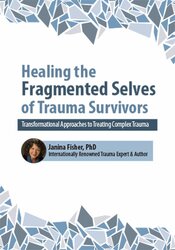

Because trauma lives in the body, traditional talk therapy cannot access the deeply rooted, pervasive wounds that complex trauma leaves behind. Many traumatized clients present with overlapping symptoms including self-hatred, self-alienation, addition, internal conflict, numbing or shame.
With these clients, you may constantly feel stuck treating surface-level symptoms or the “crisis of the week.” As a result, you are left overwhelmed and frustrated that you can never get to treating the trauma, despite your best efforts.
Go beyond symptom reduction and take your work with traumatized clients to a whole new level by implementing this transformational approach to trauma treatment.
Watch world-renowned complex trauma and attachment expert Janina Fisher in this intensive workshop recording. Her cutting-edge approach will shift your clinical perspective so you’ll see your client not as a traumatized whole person, but rather as fragmented pieces that are in need of healing.
Over the two days of this course, Janina will teach you to go beyond treating surface-level symptoms and give you the tools you need to look at trauma treatment through a whole new lens. Janina’s innovative approach integrates Sensorimotor Psychotherapy, Internal Family Systems, and Ego State Therapy to get to the root of the problem where trauma can truly be processed.
Janina will teach you how to help clients struggling with suicidal and self-destructive impulses, loss of identity, and self-hatred caused by childhood trauma. You’ll walk away with the skills you need to help your fragmented and traumatized clients achieve self-compassion and acceptance of all aspects of self.
Through real-life, in-session videos, practical mindfulness exercises, and unique insight from the field of neuroscience, you’ll learn powerful strategies to use in your practice to overcome the devastating impacts of childhood abuse and repair childhood wounds.
Revolutionize the way you treat trauma!
| File type | File name | Number of pages | |
|---|---|---|---|
| Manual - Healing the Fragmented Selves of Trauma Survivors (6.8 MB) | 77 Pages | Available after Purchase | |
| Manual - Healing the Fragmented Selves of Trauma Survivors - French (6.8 MB) | 77 Pages | Available after Purchase | |
| Manual - Healing the Fragmented Selves of Trauma Survivors - Italian (6.8 MB) | 77 Pages | Available after Purchase |

Janina Fisher, PhD, is a licensed clinical psychologist and former instructor at The Trauma Center, a research and treatment center founded by Bessel van der Kolk. Known as an expert on the treatment of trauma, Dr. Fisher has also been treating individuals, couples, and families since 1980.
She is past president of the New England Society for the Treatment of Trauma and Dissociation, an EMDR International Association Credit Provider, Assistant Educational Director of the Sensorimotor Psychotherapy Institute, and a former Instructor, at Harvard Medical School. Dr. Fisher lectures and teaches nationally and internationally on topics related to the integration of the neurobiological research and newer trauma treatment paradigms into traditional therapeutic modalities.
She is co-author with Pat Ogden of Sensorimotor Psychotherapy: Interventions for Attachment and Trauma (2015) and author of Healing the Fragmented Selves of Trauma Survivors: Overcoming Internal Self-Alienation (2017) and the forthcoming book, Working with the Neurobiological Legacy of Trauma (in press).
Speaker Disclosures:
Please wait ...